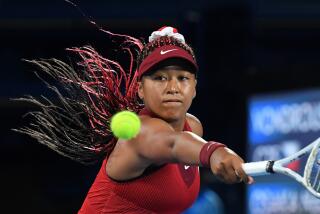In Tennis, She Has Set Standard
- Share via
If I were to tell you one of the greatest athletes of the 20th Century--and maybe the greatest of our times--would be appearing in Manhattan Beach this week, would you go there expecting to see: (a) Jose Canseco, (b) the ghost of Jim Thorpe, (c) Nick Faldo, (d) Pete Rose, (e) Joe Montana or (f) any Detroit Piston?
What you would find there is none of the above. What you would find is an athlete who is pound for pound, inch for inch the greatest of the era, an athlete who weeps in victory, smiles in defeat, wears designer clothes and actually looks good in earrings.
No one is sure whether God is a woman, but it just may be that the greatest tennis player in history is.
Listen, when you talk of all-time sports feats, hitting in 56 consecutive baseball games, pitching six no-hitters, scoring 100 points in an NBA game or winning three Super Bowls stand out.
But winning nine Wimbledons?! That makes the list with any of them at any time.
It is the tennis feat of all time. It makes Martina Navratilova the best ever to play that game. Big Bill Tilden? He won three Wimbledons, thank you. Don Budge? Two Wimbledons. Rod Laver? Four Wimbledons. Bjorn Borg? Five Wimbledons. Ivan Lendl? None.
You have to dip into antiquity to find a matchup for Navratilova. Only the elegant Helen Wills Moody, who won eight Wimbledons, is in her class.
That’s what you have to do with the truly marvelous--measure them not against their contemporaries, but against their ancestors, against history. Helen Wills was to tennis what Babe Ruth was to baseball. Henry Aaron breaking Babe’s all-time record was no greater an accomplishment than breaking the great Queen Helen’s. People thought neither of them would ever be matched.
Martina won more than a tournament. She won her way into legend. She now plays for the ages. She escapes the fine print. To be in the same paragraph with Helen Wills is an achievement. To reduce her to a footnote is to take over tennis.
Helen Wills used to play with the fixed expression of someone trying to win a pot with two treys. Martina plays with the intensity of a deer fleeing a forest fire, but she turns as coldly efficient as a serial killer when the Queen’s cup is on the line.
She is in a business where the average age seems to be somewhere between 14 and 19 but, at 33 nearing 34, she manages to dispatch these younger, fiery schoolgirls with the steady competence of someone plucking chickens.
Martina never seems to come to a game in emotional disarray. She is as tough and focused as Mike Tyson with his man on the ropes or Nolan Ryan with a guy looking for the curve.
She dispatched a schoolgirl (Debbie Graham, Stanford) in a little over 45 minutes Tuesday with almost bored nonchalance. It was like watching someone pull wings off a butterfly--except that Martina treats every match as if it is a Wimbledon final. She confided afterward that she was fearful after a five-week layoff that she might have forgotten how to play.
How could Martina forget how to play tennis? What does it take to win nine Wimbledons in the first place? What does it take to be and remain Martina Navratilova?
Plenty. It calls for the tenacity of purpose of a bulldog on a rope. In Helen Wills’ time, tennis was not exactly a profession. It was more of a pastime for the not-so-idle rich. Tournaments were spaced, outdoors and relentlessly amateur. Silver cups were at stake, not silver Rolls-Royces.
The competition was genteel. Tennis was largely something to do before the cotillion started.
Today, it’s Wall Street with rackets. Big bucks, high pressure. It’s a jungle out there.
You need your own masseuse. You need your own osteopath. You travel in an entourage. You’re on an airplane, in a limo--or on the court.
You have to watch what you eat. “Your body is like a vintage Rolls-Royce,” Martina says. “You have to be careful what fuel you put in.”
You have oatmeal and carrot juice for breakfast. Doughnuts are out. Even orange juice. “Sugar is a drug,” Martina insists. “A mind-altering drug. It is the most abused drug in America. It gives you a high and then it does what all drugs do--brings you down and in despair. Robs you of precious energy.”
Red meat is OK. Once a month. “I love hamburgers,” Martina admits. “But if I ate them every time I wanted them, I wouldn’t make the quarterfinals.”
The body is treated as deferentially as a sovereign. Some women check the mirror for their beauty. Martina checks it for her health. It is her belief that only her mind is 33 years old. The rest of her is still in her teens.
“It’s a narcissistic life,” she says. “But it’s necessary.”
Most people wear glasses so they can see 20/20. Or even 20/30. Martina can already see 20/20 with the naked eye. She wears glasses because they correct her vision to 20/10. Martina takes every edge into the match she can muster.
She lifts weights not to build up her muscles, but to build up her endurance. Martina’s body is not a set of muscular knots. It’s chorus-line round.
She ices her knees after every match. She’s a late sleeper. The body is pampered, but Martina shows little patience with the athlete in it. She is an expert skier, defiant of the possibility of a fracture.
If tennis were a morality play, Martina would be the villain. She has a nice smile but in the early years of her career, she used it sparingly. She had come into the game out the gloom of Kafka’s Czechoslovakia, where smiles were rationed like sausages. She learned to play tennis hitting a ball against a barn door. “It’s hard to learn the game when your competition is a wall.” When she began to beat the golden Chris Evert and everybody’s darling of the center court, Evonne Goolagong, Martina was treated like a truck driver at a royal lawn party. Not anymore. Martina is the royalty on the court now. The crowds come to see her in the Virginia Slims tournament at Manhattan Country Club this week. She is an American heirloom.
She is, typically, hardening her body and toughening her mind for the U.S. Open. After all, she has only won four of those. (Borg never won any).
But her ambition is not a 10th Wimbledon or a fifth U.S. Open, it’s to win a gold medal for the United States in the Barcelona Olympics in ’92.
It’s an interesting ambition. Even curious. Until you remember that Helen Wills won one in 1924.
More to Read
Go beyond the scoreboard
Get the latest on L.A.'s teams in the daily Sports Report newsletter.
You may occasionally receive promotional content from the Los Angeles Times.









